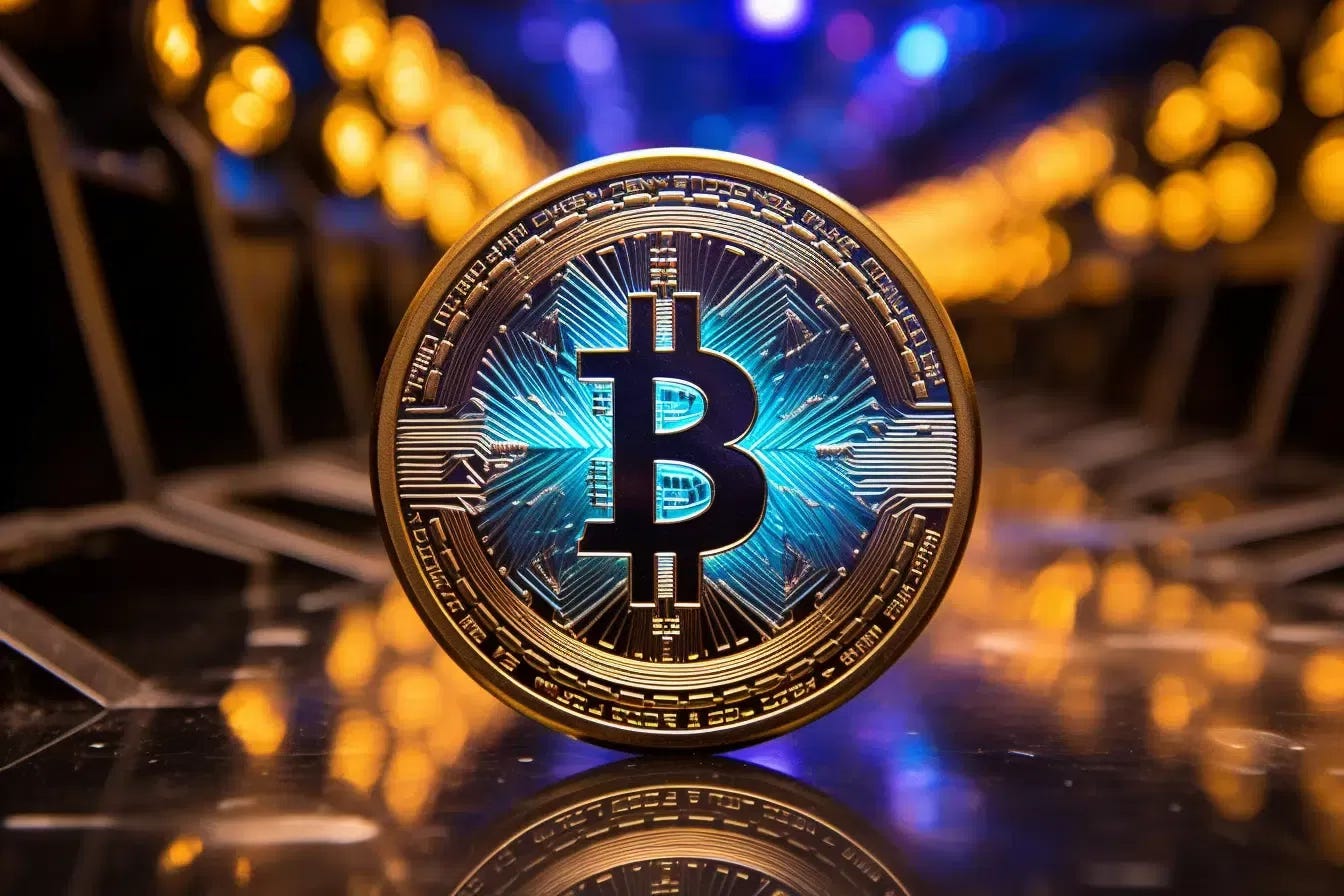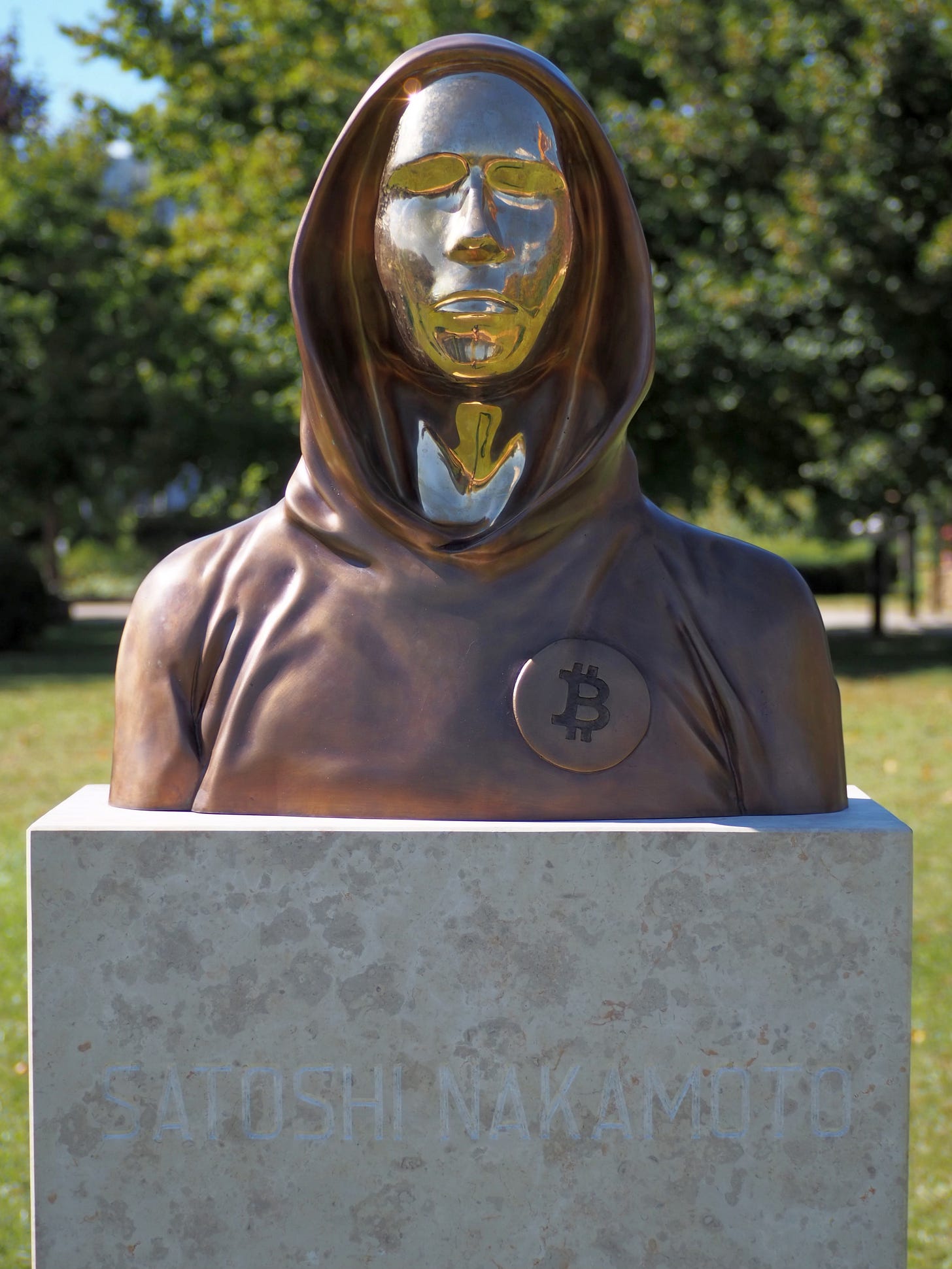Bitcoin 101: The Secret Power Behind Decentralized Electronic Money
The 'gold' of the 21st century
This is MathMadeSimple, by Álvaro Muñiz: a newsletter where you will discover how math appears in every aspect of your life, from decision-making to personal finance.
Today’s issue is the first in a series of articles where we explore cryptocurrencies.
We will focus on the godfather of the crypto world: Bitcoin. The key concepts here apply to most of the cryptocurrencies available in the market.
This is not an encouragement nor discouragement to go buy cryptocurrencies. My goal is to let you know what exactly Bitcoin is and what makes it different (and similar) to other currencies like dollars or euros.
🙇🏽♂️ Today in a nutshell
Bitcoin is a digital document containing the list of all the transactions that were made since 2009.
To avoid having a central authority that holds the list, everyone participating in Bitcoin owns a copy of the list.
The hard thing is to make sure that every person has the same list—that everyone’s list is being updated the same way.
The key idea of Bitcoin is to require proof of work to trust a transaction. This requires solving a mathematical puzzle, and people who work on solving puzzles are called miners.
📅 The history of Bitcoin
Bitcoin’s story is pretty unique.
It all began in 2008 when someone under the name Satoshi Nakamoto published a paper titled ‘Bitcoin: A Peer-to-Peer Electronic Cash System’.
Sixteen years later, and despite the big buzz that Bitcoin has caused, we have no idea who Satoshi Nakamoto is. We don’t know if they are living in an island in the Bahamas or a humble life in God-knows-where. We don’t even know if they are still alive.
Oh, and by the way, Satoshi Nakamoto owns around 1,000,000 BTC from its early days. At today’s price, this is about 60,000 million euros, making the guy one of the 25 richest people in the world. Where the hell are you Satoshi!?
Anyways. In the paper, Satoshi Nakamoto introduced a ‘peer-to-peer version of electronic cash (that) would allow online payments to be sent directly from one party to another without going through a financial institution’.
We have several key concepts here:
electronic cash
without going through a financial institution
In other words: decentralised (electronic) money.
Let’s explain what these words mean.
💶 Electronic money
What is money?
In economics, money is often defined by three properties:
It stores value.
It is a medium of exchange
It is a unit of account.
In plain English: (1) a euro today will have the same value tomorrow; (2) I can use my euros to buy products; and (3) we can measure the value of things in euros.
I am not an economist but you probably agree with me that many forms of money do not store value. Aside from inflation, there have been several times in history where a properly established form of money has lost its value (see the recent devaluation of the Argentinian peso).
Let us define money as anything that can be exchanged for other goods (medium of exchange). This is certainly the most important property of money.
💳 Your own form of money
Imagine you and your friends go on a trip. You pay everyone’s bus fare to get to the city center; your friend pays lunch downtown; you buy your other friend a beer…
Each time someone pays something for another person, the other person could just pay them back. Easy—but very inefficient.
Instead, you could grab a piece of paper and write down what everyone is spending:1
Omaira pays lunch for Tito (20€)
Iago buys a beer for Aitor (5€)
Aitor pays Iago back (5€)
…
With this new system that you have created, you don’t need to exchange money among yourselves anymore. Say Carlos wants to buy a cigarette from Pablo, and Pablo is willing to sell it for 1€. Instead of actually exchanging the money, to keep making things efficient Carlos could simply grab the piece of paper and add a transaction ‘Carlos owes Pablo one euro (1€)’.
Our ledger (the piece of paper) is now a medium of exchange. We just created a new form of money!
It is only used by you and your friends (for now), but it is serves the same purpose as euros—at least for you guys.
How should we call this currency? ‘The ledger’ doesn't sound too appealing for a new currency. Why not call it Bitcoin instead?
If you are going to take only one message out of this post, let it be this:
Bitcoin is the history of its transactions since 2009—the ‘piece of paper’.
It is as simple as that. Bitcoin is the history of all the transactions that some very large group of friends started to write on a piece of (electronic) paper in 2009.
Here is the main problem, and what makes Bitcoin interesting:
🕴🏽Who owns the ledger?
Someone has to store the ledger. This means he will be the boss. If someone comes to the boss with a transaction, he will check it and write it down in the ledger if he approves it.
But what if he doesn’t approve it? What if the boss gets annoyed at Diana and decides not to write down her transaction? What if he decidse to hide the ledger from the rest, and now no-one knows how much they owe or are owed?
This system involves too much trust in the boss: we do not want a boss.
Let’s do something crazy: let’s give everyone a copy of the ledger. That way there is not a boss—everyone is the boss.
Each person that participates in Bitcoin owns a copy of all the transactions made since 2009
Every time someone makes a transaction, they will write it down in their own ledger and let the rest of the people know (imagine it like this: every time you sign a transaction, it automatically gets shared in social media).
But this has some problems…
🤝 Consensus
Now everyone owns a copy of the ledger. How can we make sure that all the ledgers are being updated in the same way?
Say at some point the ledgers of each one of you look something like this:
Omaira pays lunch for Tito (20€).
Iago buys a beer for Aitor (5€).
Aitor pays Iago back (5€).
Carlos owes Pablo one euro (1€).
Now I go for dinner with Aicha and she pays for dinner, so I add to my ledger:
5. Aicha pays dinner for Alvaro (20€)
and I broadcast it to the rest of the people.
But Ana has also just gone for dinner, so she added to her ledger:
5. Ana pays dinner for Carmen (15€)
and she let the rest of the people know.
My ledger is now different than Ana’s. Not only that— you, who are sitting in the other table listening for transactions, which of the two transactions do you add first? Is my version more trustworthy, or is Ana’s?
The magic of Bitcoin is to create a system (a ‘protocol’) for people to add transactions to their ledgers, in such a way that they can be sure that everyone has an identical ledger—and all this without a central authority.
No one supervises transactions—yet we can be sure all ledgers are the same. We will see this in detail in a future post, but let me give you an idea.
🪨 Proof of work
Every time someone wants to add something new to the ledger, they (or rather, their computer) will first need to solve a mathematical puzzle. Any transaction that does not contain the solution to this puzzle will be considered invalid.
Don’t panic! You can use our ledger system without having to bother solving the puzzle yourself. If you want to add a transaction to the ledger, you can send it to someone willing to solve the mathematical puzzle for you. They will work hard, solve the puzzle and they will add the transaction for you.2
A ‘miner’ in Bitcoin is a puzzle-solver
Miners are the only people that can add something new to the ledger. Once they do, they will broadcast it to the rest of the people and the rest will update their ledgers. They have worked hard to solve the puzzle—their solution has proof of work.
You might be thinking: but now we are trusting the miners!
And you are right. Well, almost right. The key of proof of work is that, since it requires work, for a miner to fool the system they would need to do a lot of work.
And when I say a lot of work, I really mean a lot:
For a miner to fool our system, they would need to have at least 51% of the computing power.
If there was only one miner, he could get mad at Diana and not add her transaction—just like when we had a boss. But in Bitcoin everyone can be a miner: you only need to like solving puzzles! There are millions of miners in the world nowadays.
One miner can get mad at Diana and decide not to add her transaction. But the other 999,999 miners have nothing against Diana. When Diana asks the community of miners to add her transaction to the ledger, the stubborn miner will have to solve the mathematical puzzle faster than the other 999,999.
Sure, this can happen once (maybe by pure luck). But Diana will keep asking for her transaction to be added to the ledger. The only way that our stubborn miner will be able to consistently solve the puzzle faster than the rest is if he outperforms the rest of the miners altogether. Consistenly. 1 vs 999,999.
Good luck for the stubborn miner.
🆕 In future editions…
If everyone owns a copy of the ledger and can see all transactions…what happens with privacy?
How are transactions added to the ledger? The Blockchain
Why would you want to be a miner? Block rewards
Why is Bitcoin compared to gold? ‘Halving’ in Bitcoin
🤔 Can’t wait to learn more?
You can try Bitcoin’s white paper.
If you want to go deeper into the weeds, this video by 3Blue1Brown is so good.
Ask questions in the comments! Let me know what you’d like to know more about, or what was not clear from this post.
In reality, transactions also need to include an (electronic) signature. That way I cannot write ‘Doug owes Alvaro $50’—it is only Doug that can write such transaction. The world of electronic signatures is already interested on its own, but let’s just take it as a black box for now.
Ever heard about Bitcoin having very high fees to process transactions? This fee is what you are paying in exchange of someone else solving the puzzle for you.





I finally start to understand bitcoin!! 👏🏽👏🏽👏🏽
Muy didáctico e interesante. Esperando la siguiente entrega...